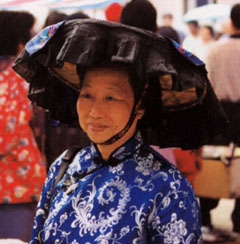The Hakka culture(原创)
As a Hakka people, I'm very proud of the centuries-old history of the Hakka Culture. Maybe most of the people don’t know the origin of Hakka. Here I'd like to introduce something about it, but never enough.

Who are the Hakkas
The Hakkas are a unique ethnic group of "Han" Chinese originally active around the Yellow River area. They are thought to be one of the earliest "Han" settlers in China. One theory has it that many of the early Hakkas were affiliated with the "royal bloods". The truth may be more complicated than that. It is highly likely that while Hakka may be a stronghold of Han culture, Hakka people also have married other ethnic groups and adopted their cultures during the long migration history of 2000 years. Due to the infusion of other ethnic groups from the northwest, north and northeast, these original settlers gradually migrated south and settled in Jiangxi, Fujian, and Guangdong. They were called Hakka by the locals when they first settled in. This term has been used since by non-Hakka and Hakka people, and in international publications. The spelling "Hakka" is derived from the pronunciation in Hakka dialect ( pronounced as "haagga" in Hakka and "kejia" in Mandarin).

Several elements of the Hakka culture
The building Round House(围屋,土楼) play an very important role during the long migration history of 2000 years of Hakka ethnic ,and now it is one symbol of the Hakka culture. After they settled in the local area, because of the limited grounds resource they had to compete with the locals. Failed to have the blessings and protection of the emperor (who was in trouble himself), they were often attacked by the locals. The round houses were built as a very defensive structure to fend off the locals.
Here are some customs during the Lunar New Year.On the first day of the New Year the Hakkas are very particular about unpropitious words. No sweeping the floor on the first day of the New Year has become a Hakka custom. Whatever needed to be swept has been swept away on the New Year Eve. Usually they put away the brooms and dustpans to an obscure place where it cannot been seen by anyone especially the guests. The purpose of not cooking on the first day of the New Year, actually is considered more as the day of rest for the housewives than a custom. The food for that day was prepared the previous day.
The Hakka people, paradoxically conservative and endeavoring, hard-working and enduring, is reflective of the spirit of Chinese culture.
(作者:何俊鹏 Many words referred to:http://www.asiawind.com/hakka/)
|